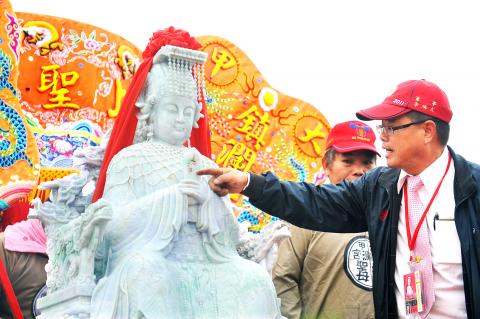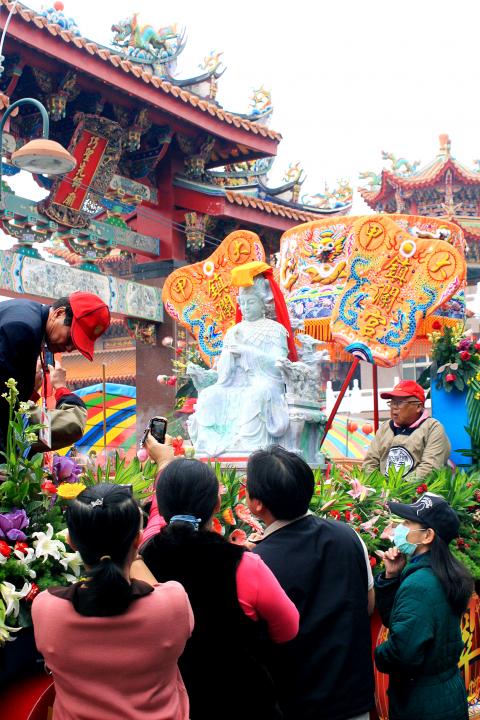A 1.30m tall Matsu statue, carved out of emerald in China, landed at Taichung Harbor yesterday after making the short crossing from Meizhou Island off the coast of southern China.
The statue, weighing 1.5 tonnes, was created by Fujian-based Chinese master sculptor She Guoping (佘國平) for a jewelry company in Shanghai.
It is to be donated to the Jenn Lann Temple (鎮瀾宮) in Greater Tai-chung’s Dajia (大甲) district, one of the country’s most popular Matsu temples.

Photo: Yu Po-lin, Taipei Times
The dedication and donation ceremony was held in Meizhou on Saturday.
Matsu (媽祖), the goddess of the sea, is one of the most popular deities in Taiwan. According to legend, Matsu was a girl from the Ming Dynasty (1368-1644) who was deified posthumously in honor of the assistance she offered to seafarers. Since being brought to Taiwan by Chinese immigrants in the 1600s, Matsu traditions have attracted many local worshipers.
Greater Taichung Mayor Jason Hu (胡志強) yesterday received the valuable statue, along with Jenn Lann Temple president Yen Ching-piao (顏清標).

Photo: Yu Po-lin, Taipei Times
Hu said the religious event, which he described as an exchange of beliefs and feelings between people from the two sides of the Taiwan Strait, would pull the two sides closer together.
Asked about the statue’s value, Jenn Lann Temple vice president Cheng Ming-kun (鄭銘坤) declined to give an exact figure, but said religious belief is “priceless.”
According to Chinese-language media reports, the value of the emerald statue is at least 180 million yuan (US$28.25 million).
A four-day, three-night parade will be held in Taichung to celebrate its arrival.
The procession is scheduled to make stops at major Matsu temples around the city, before reaching the Jenn Lann Temple on Sunday, where an enshrining ceremony will take place.

Nipah virus infection is to be officially listed as a category 5 notifiable infectious disease in Taiwan in March, while clinical treatment guidelines are being formulated, the Centers for Disease Control (CDC) said yesterday. With Nipah infections being reported in other countries and considering its relatively high fatality rate, the centers on Jan. 16 announced that it would be listed as a notifiable infectious disease to bolster the nation’s systematic early warning system and increase public awareness, the CDC said. Bangladesh reported four fatal cases last year in separate districts, with three linked to raw date palm sap consumption, CDC Epidemic Intelligence

The manufacture of the remaining 28 M1A2T Abrams tanks Taiwan purchased from the US has recently been completed, and they are expected to be delivered within the next one to two months, a source said yesterday. The Ministry of National Defense is arranging cargo ships to transport the tanks to Taiwan as soon as possible, said the source, who is familiar with the matter. The estimated arrival time ranges from late this month to early next month, the source said. The 28 Abrams tanks make up the third and final batch of a total of 108 tanks, valued at about NT$40.5 billion

Two Taiwanese prosecutors were questioned by Chinese security personnel at their hotel during a trip to China’s Henan Province this month, the Mainland Affairs Council (MAC) said yesterday. The officers had personal information on the prosecutors, including “when they were assigned to their posts, their work locations and job titles,” MAC Deputy Minister and spokesman Liang Wen-chieh (梁文傑) said. On top of asking about their agencies and positions, the officers also questioned the prosecutors about the Cross-Strait Joint Crime-Fighting and Judicial Mutual Assistance Agreement, a pact that serves as the framework for Taiwan-China cooperation on combating crime and providing judicial assistance, Liang

A group from the Taiwanese Designers in Australia association yesterday represented Taiwan at the Midsumma Pride March in Melbourne. The march, held in the St. Kilda suburb, is the city’s largest LGBTQIA+ parade and the flagship event of the annual Midsumma Festival. It attracted more than 45,000 spectators who supported the 400 groups and 10,000 marchers that participated this year, the association said. Taiwanese Designers said they organized a team to march for Taiwan this year, joining politicians, government agencies, professionals and community organizations in showing support for LGBTQIA+ people and diverse communities. As the first country in Asia to legalize same-sex